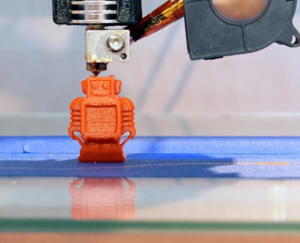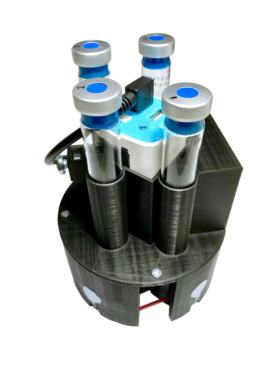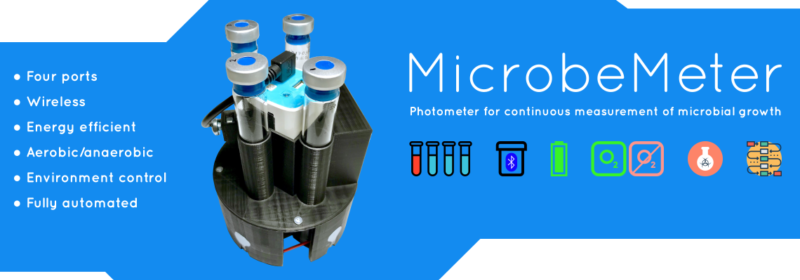Making microbiological research affordable and open-source
Posted on October 15, 2018 by Orkun Soyer & Kalesh Sasidharan
Improving access to research and data is a topic many of our members are passionate about. Humane Technologies is a company set up by some microbiologists from the University of Warwick. Humane Technologies have developed an affordable photometer that allows continuous monitoring of microbial growth, called MicrobeMeter. Below, they explain what inspired them to make this equipment freely available and why you shouldn't need huge amounts of funding to make important scientific discoveries.

Anthonie van Leeuwenhoek
The origins of microbiology go back to Antonie van Leeuwenhoek, a self-made scientist. Antonie ran a draper shop, and his need to check the quality of his threads led him to develop an interest in making magnifying glasses. The lenses he developed were so powerful that he was able to use them to examine all kinds of biological samples. His superior lenses led him discover microbes for the first time in 1676.
In our modern day, we are more accustomed of scientific discoveries and inventions coming from the laboratories of well-funded, professional scientists, usually working at world-leading Universities. We assume that science has become so specialised and so detailed in its quests, that new discoveries can only come from advanced studies undertaken with highly specialised equipment. This may indeed be the case in some disciplines like chemistry and physics, however, in biology we still have room for discoveries by using even the most basic equipment and by conducting the simplest of experiments.
There are more than 10,000 catalogued microbes, but only about 500 of these have ever been grown in a laboratory! Within these 500, only a handful of microbes have been extensively researched. It is, thus, not far-fetched to expect that even basic studies of culturing, and physiological experiments could lead to new discoveries from the microbial world in terms of new species, new molecules, or new physiological properties, as happened recently in a high-school project.
It can be argued that discovery and invention in biology would be enhanced by opening up access to existing scientific knowledge and instrumentation. While scientific literature is becoming increasingly open-access, the same is not yet true for scientific equipment. For many higher-education and research institutions, schools, and public spaces, biological experimentation remains out of reach. This is because most scientific equipment is made available only under proprietary protection and at high prices, supposedly due to initial development costs and supposed small market sizes. On the other hand, lowering prices and opening up device design could allow more people to undertake scientific research, leading to larger markets, which could then feedback to further lowering of device prices.

This kind of feedback dynamics, leading to cheaper equipment and larger user base at the same time is witnessed regularly in the fields of electrical engineering and manufacturing. Microprocessors such as Arduino and Raspberry Pi have allowed millions of users - from professional engineers to ordinary people - to create, innovate, and design new electronic gadgets and systems. Alongside this, 3D printing brought design and manufacturing to the reach of ordinary people. These devices have also become a core component of STEM education, with high schools introducing computing with Raspberry Pi, and computer aided design using 3D printing machines.
It is possible that something similar can be achieved in biology and initiate the emergence of do-it-yourself biology. Increased access to biological research can indeed be made possible by making research equipment open-source, affordable, and as simple as using microprocessors and 3D printers. This trend is already underway, with increasing numbers of scientists developing their own technology, ranging from 3D printed research equipment to origami microscopes. These scientists are driven by a desire to make their own research easier to conduct, and to make scientific research more accessible to others. These two drivers are naturally linked, with any device becoming simpler becoming also more accessible (and possibly cheaper to make).
A case study of open-access, affordable, do-it-yourself research equipment; MicrobeMeter:

Working with anaerobic microbes, we found it frustrating and difficult to collect growth data using bench-top spectrophotometers. Most anaerobic organisms grow slowly and acquiring growth data at high-resolution becomes laborious or even impossible depending on the exact growth conditions required. To solve this problem, we developed a 3D printed device that can accommodate commonly-used anaerobic Hungate tubes and takes growth readings as frequently as every second. We also built in a wireless data collection feature using an Arduino-compatible amplifier unit, along with custom programs for data logging, visualization, and analysis.
When we finalized our design, we realized the cost of parts required to make the device was around £150 (assuming access to a 3D printer). A spectrophotometer costs more than £1000. Part of this cost difference is due to the fact that our device takes measurements at a single wavelength, but this simpler optical design is perfectly sufficient for growth rate measurements and provides possible advantages. Furthermore, the device implements a classical experimental design with 3-sample tubes and 1-blank tube, allowing publication ready growth data to be collected and presented with error margins in a single run.
The simplicity and usability of our device, which we have called MicrobeMeter, demonstrates how efforts to make scientific equipment simpler can also make it more accessible and affordable. Realization of this point, in fact, made us to take our device as a starting point of a new spin-out company from the University of Warwick. Through this company, we aim to make more devices that are designed by us, or in collaboration with other scientists, available in an open and affordable manner. In the case of MicrobeMeter, we are already providing the blueprints through our company website for anyone to build and develop the device for free, and also offer do-it-yourself and ready-made versions of it through our Kickstarter campaign.

While MicrobeMeter is a specialized equipment that would be of interest and use to practicing scientists and students, we believe that future products can become increasingly attractive to a wider audience. By simplifying equipment, increasing their biological safety, as well as their usability, we can make biological research accessible to more and more people from under-funded scientists in the developing world, to high school students, to innovators at heart.
We believe that this, in turn, will increase our chances to discover and innovate more in biology and medical sciences.
by Humane Technologies
A spinout company from the University of Warwick, focusing on the design and development of innovative, affordable, and open-source measurement equipment that will allow biological research and data collection for anyone from under-funded scientists to school students to innovators at heart.
